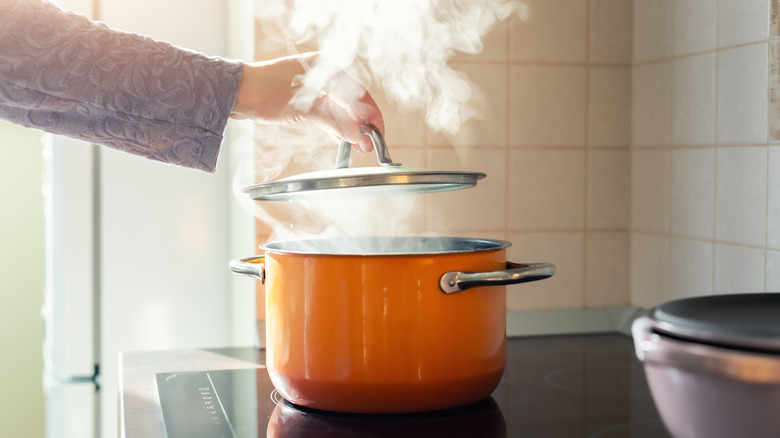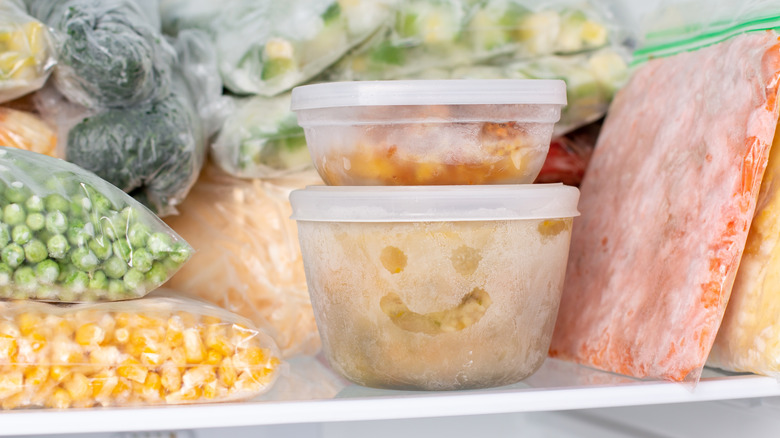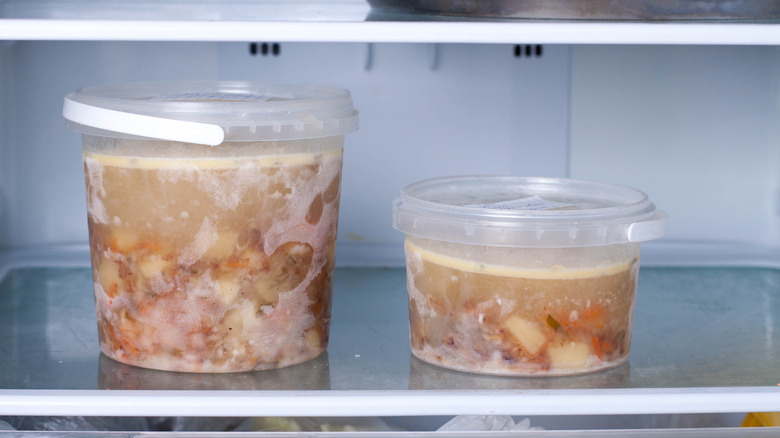Why You Should Consider Doubling Your Next Batch Of Soup
The phrase "soup season" has emerged as a colloquialism commonplace among self-professed foodies and non-foodies alike. When September rolls around, you're likely to see the alliterative slogan at the top of recipe collections, or emblazoned on decorative wood panels described as "rustic." According to a study by Campbell's Soup Company, 95% of U.S. consumers said they like or love soup. January is celebrated as National Soup Month. There's even an online community called Soup Season where enthusiastic soup lovers convene — and we understand the hype.
There's a long-running line of self-help books called "Chicken Soup for the Soul" for a reason. Soup is nourishing, it's comforting, and — perhaps best of all — it's wildly versatile. Fall days are made for hot, thick, steamy bowls of chicken noodle soup. There's a dizzying array of veggie soups for plant-based eaters to curl up with, too. Foodies love soup so much that they've created soups inspired by pre-existing entrees like cabbage rolls and chicken pot pie. There's even seafood soup. (According to our readers, the best one is clam chowder.) If you're like many fans, "small" is not the way you'd describe your ideal bowl. But, bigger is better for economical and convenience reasons, too. Here's why you should consider doubling your next batch of soup. (As if you needed another reason.)
Soups freeze with ease
The best part about making more soup is that you get more soup. Introducing: the coziest meal prep ever. Soups are one of the easiest foods to freeze. That steamy bowl may be yummy when you make it hot and fresh on the stove, but it can be just as cozy the second time around.
According to MasterClass, broth-forward vegetable soups and hearty stews hold up best in the freezer. Be careful with potatoes, noodles, and rice. Their starchiness is liable to absorb a significant amount of water in the freezer, which can make them a little mushy after the reheat. If you don't mind a softer bite, go ahead and freeze away.
In most cases, it's a good idea to avoid freezing soups with cream-based broths. Dairy won't hold up in the freezer, says Taste of Home, and it runs the risk of separating during reheating. But, if you do decide to freeze a dairy-based soup, whisk in a little sour cream or heavy cream as you reheat for a textural helping hand. Slowly incorporating a cornstarch slurry will also do the trick. If you're reheating a soup that contains meat, says Martha Stewart, bring it to a boil for three minutes to kill any harmful pathogens that could be lurking.
How to freeze an extra batch of soup
Make sure your soup has completely cooled before freezing. Martha Stewart suggests sticking your hot soup pot in a big ice bath to speed up the process. If you're planning on freezing multiple batches of different soups, it's not a bad idea to label your containers, says Taste of Home.
Most common kitchen containers work just fine for freezing soup. Per MasterClass, you can use Mason jars if you wrap them in plastic wrap or pop 'em in a gallon freezer bag to block out freezer burn. Just be sure not to overfill glass jars: Soups expand during freezing and you don't want the jars to crack. Plastic airtight resealable containers work, too. Perhaps the easiest method is good old plastic bags. You can ladle (fully cooled!) soup directly into plastic Ziploc bags and pop the extra batch in the freezer for instant cozy dinner weeks from now. Or, you can freeze it in pre-portioned single-serve bags for a quick and easy solo dinner. For homemade stocks and broths, MyRecipes suggests freezing them in an ice tray. Frozen soup will last for a while, too. Most soups keep in the freezer for up to three months, but brothy vegetable soups can hold up for closer to six months.


